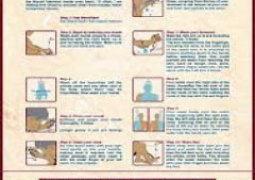
Abu Hurairah reports that the Prophet said: “Whoever fails to pray the two [Sunnah] rak’at of the fajr until the sun rises, [he should then] pray them.” This is related by al-Baihaqi. About its chain an-Nawawi says it is good.
Qais ibn ‘Umar relates that he went to the dawn prayer and found the Prophet praying fajr. Although Qais had not prayed the Sunnah prayer, he joined the Prophet sallallahu alehi wasallam and prayed with him. When he had finished salatul fajr, he prayed the two rak’at (sunnah) prayer. The Messenger of Allah passed by him and inquired: “What is this prayer?” Qais then informed him of all that had happened. The Prophet kept silent and did not say anything. This is related by Ahmad, Ibn Khuzaimah, Ibn Hibban, at-Tirmizhi, Abu Dawud, and Ibn Majah. Al-’Iraqi says its chain is hasan.
Ahmad, al-Bukhari, and Muslim relate from ‘Imran ibn Hussain that, during a journey, the Prophet slept past the time of salatul fajr and when he woke he waited for the sun to rise a little and then he ordered the mu’zhzhin to make the azhan. Then, the Prophet prayed the fajr sunnah, after which he ordered the Iqamah to be made and prayed salatul fajr. It is apparent from this hadith that one is to make up the sunnah prayer before or after the sun rises, regardless of whether only sunnah prayer is missed or both sunnah and fard are missed, and whether there is a valid excuse or not. It may be made up by itself or with the obligatory dawn prayer.
The Sunnah Prayer Of Zuhr
It has been related that the sunnah rak’at at zuhr are four, six, or eight.
Reports concerning four rak’at
Ibn ‘Umar said: “We observed and preserved from the Prophet ten rak’at [of sunnah prayers]: two before zuhr and two after it, two after maghrib in his house, two after ‘isha in his house and two rak’at before the fajr.” This is related by al-Bukhari.
Al-Mughirah ibn Sulaiman reports that he heard Ibn ‘Umar say: “The Prophet never left the two rak’at before zuhr and two rak’at after it, two rak’at after maghrib, two rak’a~ after ‘isha and two rak’at before fajr.” This is related by Ahmad with a good chain.
Reports concerning six rak’at
‘Abdullah ibn Shaqiq said: “I asked ‘Aishah about the prayer of the Prophet and she said: ‘He would pray four rak’at before zuhr and two after it.”’ This is related by Ahmad, Muslim, and others.
Umm Habibah bint Abu Sufyan reports that the Messenger of Allah said: “Whoever prays twelve rak’at during the day and night will have a house built for him in paradise: four rak’at before zuhr and two after it, two rak’at after maghrib, two rak’at after ‘isha, and two rak’at before fajr.” This is related by at-Tirmizhi who called it hasan sahih. Muslim reports it briefly.
Reports concerning eight rak’at
Umm Habibah reports that the Prophet said: “Whoever prays four rak’at before zuhr and four after it, Allah will forbid that his flesh be in the fire.” This is related by Ahmad, Abu Dawud, an-Nasa’i, Ibn Majah, and at-Tirmizhi who calls it sahih.
It is related that Abu Ayyub al-Ansari would pray four rak’at before zuhr. The people said to him: “You made that prayer continue too long!” He said: “I saw the Messenger of Allah doing so. I asked him about it and he said: ‘It is a time in which the doors of the heavens are opened and I wish that my good deeds be raised (to heaven) during it.’” This is related by Ahmad with a good chain.
The merits of four rak’at before zuhr
‘Aishah said: “The Prophet never left praying four rak’at before zuhr and two rak’at before fajr under any circumstances.” This is related by Ahmad and al-Bukhari. It is also related from her that during those four rak’at, he would prolong the qiyam [the portion in which one recites the Qur’an] and perfect the ruku’ and sujud therein.
There is no contradiction between the hadith of Ibn ‘Umar, which states that the Prophet prayed two rak’at before zuhr, and other hadith which state that the Prophet prayed four rak’at before zuhr. Ibn Hajar writes in Fath al-Bari: “It is better to take them as describing different circumstances, sometimes he prayed two rak’at and sometimes he prayed four rak’at. Some say that it may be construed that if he prayed them in the mosque, he prayed only two rak’at, and when he prayed in his house, he prayed four rak’at. On the other hand, it could imply that he prayed two rak’at in his house and then went to the mosque and prayed two rak’at there also. Ibn ‘Umar only saw what he prayed in the mosque and not what he prayed in his house, while ‘Aishah was aware of both of them. The first interpretation is strengthened by what Ahmad and Abu Dawud recorded from ‘Aishah, namely, that the Prophet prayed four rak’at in his house before zuhr and then he went to the mosque.”
Abu Ja’far at-Tabari says: “Most of the time he prayed four rak’at and occasionally he prayed two rak’at.”
If one prays four rak’at before or after the noon prayers, it is preferred to pray them in two sets consisting of two rak’at each, although it is permissible to make them together with only one taslim at the end of the four rak’at, as the Prophet sallallahu alehi wasallam said: “The prayers of the night and day are (sets of) two [rak’at].” This was related by Abu Dawud with a sahih chain.
Making up the missed sunnah of zuhr
‘Aishah reports that if the Prophet missed the four rak’at before zuhr, he would pray them afterward.
This is related by at-Tirmizhi who calls it hasan ghareeb. Ibn Majah records that she said: “If the Prophet missed the four rak’at before zuhr, he would pray them following the two rak’at after zuhr.”
The preceding is concerned with making up the sunnah prayers that one is to pray before zuhr. Concerning making up the two rak’at after zuhr, we have the following reports as recorded by Ahmad.
Umm Salamah says: “The Prophet prayed zuhr and then he received some wealth and he sat to distribute it [and continued to do so] until the mu’azhzhin made the azhan for ‘asr. He prayed ‘asr and came to me, as it was my day, and he prayed two quick rak’at. I said: ‘What are those two rak’at, O Messenger of Allah? Have you been ordered to perform them?’ He said: ‘No, they are the two rak’at that I perform after zuhr but I was busy distributing this wealth until the azhan was made for ‘asr and I hated to miss them.’” This is related by al-Bukhari, Muslim, and by Abu Dawud in somewhat different wording.
To be continued





